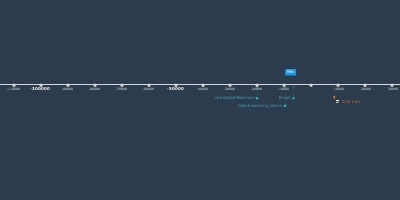Bronze age NW Europe (jan 1, 2300 BC – jan 1, 800 BC)
Description:
Bronze Age: in Northwest Europe (France, UK): 2300-800 BC;Key facts
- Be able to give five reasons why the structural adoption of bronze was a game-changer and explain them:
1: allows novel shapes that are impossible to make in stone;
2: can be 100 % recycled (first circular economy); 3: technological sophistication/progress;
4: leads to Pan-European exchange/trade networks;
5: leads to social stratification. Pan-European trade connections across Eurasia.
- Classic bronze is 90 % copper and 10 % tin;
- In the 5th millennium BC, Europe was divided into ‘stone-using (West Europe) and copper-using societies (East Europe);
- to know jadeite (jade) was the prime rare material in West Europe, whilst copper had this role in the east during the 5th millennium BC;
- Burial mounds were burial places in Bronze Age Europe, both for elites and commoners;
--> Unlike those of the Corded Ware and Bell Beaker cultures before them, are usually collective graves;
- Especially in west Europe, deceased were often cremated;
- The Bronze Age warrior ideal: males have bronze swords and toilet articles (tweezers/razors) and/or ornaments related to body/hair decoration;
- Know what a Bronze Age ‘economy of destruction’ was: a part of the bronze was not recycled but deliberately deposited in the landscape. This was done in a selective manner (specific objects were preferably deposited in specific places).
Earliest tin-bronze: at different moments in Europe- what you should know is that for west Europe, the earliest tin-bronzes are from England and date to c. 2300 BC.
- in east Europe, the 5th millennium BC is usually regarded as ‘the’ Copper Age (in west Europe, copper is introduced much later and not in such large number. Therefore, the term ‘copper age’ is usually not used for the west;
- earliest gold in Europe (and the world): Bulgaria, 4800 BC;
Added to timeline:
Date:
jan 1, 2300 BC
jan 1, 800 BC
~ 1500 years
